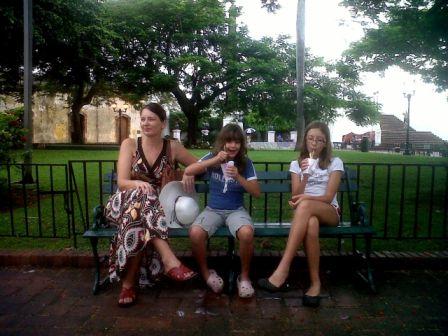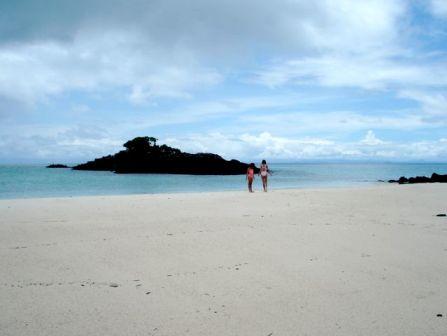From Canada to Panama: Sweltering Tropics
 My name is Laura. I moved from Canada to Costa Rica with my husband and daughter in 2002. We lived in Costa Rica until 2007, when we moved to Panama (my younger daughter was born in Costa Rica).
My name is Laura. I moved from Canada to Costa Rica with my husband and daughter in 2002. We lived in Costa Rica until 2007, when we moved to Panama (my younger daughter was born in Costa Rica).
1. Why did you move abroad?
My husband works for a Canadian reforestation company and he manages projects in Latin America. When the opportunity to move to Costa Rica came up, we jumped at the chance.
2. How do you make a living?
I work as an English language teacher. I have taught high school and tutored school-aged kids. Currently I teach adults in an evening language program. I never planned to be a teacher, but in Costa Rica people kept asking me to teach or tutor. I got my CELTA in Costa Rica and have been teaching ever since. It is a great job; I’ve met lots of interesting people teaching.
3. How often do you communicate with home and how?
I communicate regularly, every week usually, with my mom on Skype. I keep up with most of my friends and family through facebook.
4. What's your favorite thing about being an expat in Panama?
I love that Panama City is so cosmopolitan. There is an incredible mix of people here. On a typical day you will see the very posh people wearing the latest fashion, women in burkas, Kunas in traditional dress, office messengers in their bright, white guayaberas, street vendors in straw hats with brims flipped right up; it is a remarkable and beautiful mix of people. Because of the canal, there is a long history of foreigners in Panama City, and despite recent xenophobic comments by the Panamanian president, Panamanians are mostly very accepting of foreigners. It is possible to move around the city without constantly being smacked in the face with your foreignness.
5. What’s the worst thing about being an expat in Panama?
Panama is quite classist. As a Canadian, these distinctions are not always clear to me, and are often hard for me to comprehend. My first teaching job in Panama was a contract for the Department of Justice. I was teaching a beginner level, and my class had a range of people from, administrative assistants and secretaries to judges and lawyers. They were a very fun group and I possibly learned more than I taught. Near the end of the course, one of the women asked if her friend could join the class because he was just sitting outside waiting. I let him sit in, and really thought nothing of it. After the class was over, one of my students, the judge, told me that the man was a chauffeur, and that I should not have allowed him into the class. It was horribly presumptuous of him, and hadn’t I noticed how scuffed his shoes were. She was actually offended. I was shocked and frankly a little alarmed that people might be judging me by the state of my own shoes.
6. What do you miss most?
I probably most miss my family. I don’t get to see my nieces and nephew nearly enough. I also really miss my bike. Panama City is not set up for cyclists and biking is just recreational. I miss getting around and doing errands on my bike. You have to drive to the park to ride your bike.
7. What did you do to meet people and integrate in your new home?
I have kids so integration is easy in some ways. We live close to a park and our first friends were the parents of kids we met in the park.
8. What custom/ habits do you find most strange about your adopted culture?
In person, Panamanians are not rude or inconsiderate (quite the opposite actually). But, in the anonymity of their cars, it’s quite another story. People pass on the right, park their cars on corners, think nothing of driving on the shoulder to cut to the front of a line, drive through red lights, and splash pedestrians (puddles here are not innocuous, they often contain sewage), driving in Panama is much more offensive than defensive. It’s obnoxious.
9. What is a myth about your adopted country?
Panama is sometimes characterized as kind of lowbrow and tacky, a cultural wasteland of baseball, reggaeton and shopping malls. People sometimes imagine that because the Americans were here for so many years that Panama is Americanized and there are definite signs of American influence all over Panama (especially in infrastructure). It’s true that the opera and ballet are not flourishing here, but there is a wealth of Panamanian popular culture. This is a country with a population of 3.5 million people and there is a thriving local music scene, reggae, salsa and folk music. If you turn on the radio, there’s a good chance the artist singing will be Panamanian. There are all kinds locally produced TV shows and people watch them; in fact are devoted to them. Panama is incredibly vibrant culturally and I was kind of surprised to discover that.
10. What advice would you give other expats?
Learn the language and make friends with local people. Make friends with other expats. Keep up with local news--it’s good to know what’s going on around you. Also, travel as much as you can.
11. When and why did you start your blog?
I started my blog in January of this year (2011). I started it because I really wanted to share my family’s experience living here. Also I want to provide the information that I could never find, things like, day trips with kids around Panama City, or what to do with Passion Fruit.
12. How has the blog been beneficial?
It’s gotten me back into regular writing and this a very good thing. Also, if I can’t think of anything to write, it forces me out of the house with my camera and that always seems to end well!
 Laura's blog, Sweltering Tropics
Laura's blog, Sweltering Tropics
Part of the EasyExpat.com adventure since 2008. Drink, Travel, Write